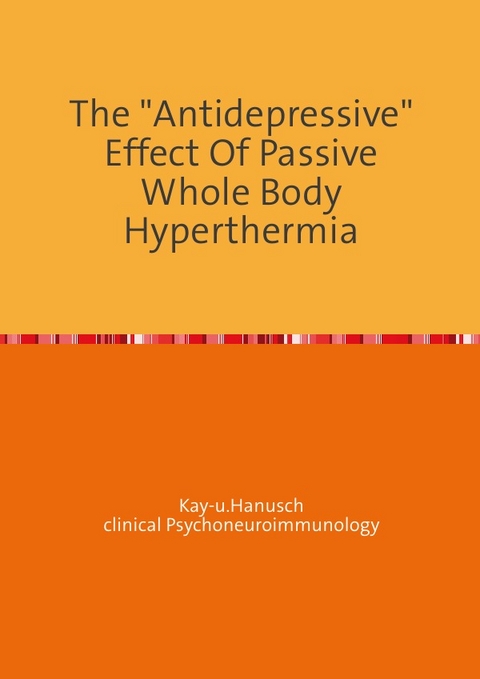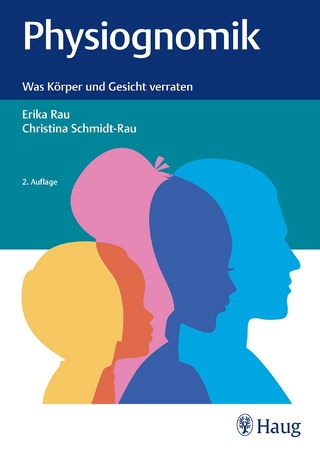
The "Antidepressive" Effect Of Passive Whole Body Hyperthermia
Influence of the psychical condition of depressive patients through passive whole-body hyperthermia
Seiten
2012
epubli (Verlag)
978-3-8442-4374-1 (ISBN)
epubli (Verlag)
978-3-8442-4374-1 (ISBN)
- Titel ist leider vergriffen;
keine Neuauflage - Artikel merken
Master's Thesis in clinical Psychoneuroimmunology / UdG & University of Graz Uni4Life 2012
Already early in the 19th century, the interaction between cells, organs and organ systems with their surroundings was recognized, which today is studied in psychoneuroimmunology. Due to the development of pharmacology up until that time, the doctors of the period implemented the existent possibilities of therapeutic intervention, such as applying heat or cold. That is, they attempted to stimulate the external membrane around dysfunctional organs and/or organ systems. The stimulation of the external membrane by means of heat therapy was of particular interest in clinical intervention at that time. In particular, the “old” doctors and therapists (like Buttersack, Kneipp, Lampert, Schlenz and Wallinski) preoccupied themselves with the effects of hyperthermia on the human body. Thus, they set out from the assumption that hyperthermia induced catalytic reactions, which not only affected the physical system (as could be observed in chemistry), but also systems of a psychological nature. Accordingly, there arose a close relationship between heat culture and the mental-spiritual representation of humans in the framework of a unit between body and soul. A depression was understood as an unnatural fatigue resulting from an uneconomic hyperarousal of the vegetative nervous system and the dysfunction of the metabolic system (which in turn derived from the former). A “jolt in the vegetative system” with all its consequences, when induced by heat therapy, would reset the metabolic system and bring about a relaxed feeling of well-being as well as improved sleep.Pharmacological research increasingly demonstrated the influence of serotonin and its receptors on thermoregulation. When dosed with serotonin the body temperature decreased and skin temperature increased. The same effect could also be observed also through agonization of 5-HT1A receptors, whereas body temperature increased when the 5-HT2 receptor was agonized. Based on these observations, a close connection to temperature regulation and physical state can be assumed in relation to an antidepressive effect from hyperthermia, which in turn guides the thesis of this work.
Already early in the 19th century, the interaction between cells, organs and organ systems with their surroundings was recognized, which today is studied in psychoneuroimmunology. Due to the development of pharmacology up until that time, the doctors of the period implemented the existent possibilities of therapeutic intervention, such as applying heat or cold. That is, they attempted to stimulate the external membrane around dysfunctional organs and/or organ systems. The stimulation of the external membrane by means of heat therapy was of particular interest in clinical intervention at that time. In particular, the “old” doctors and therapists (like Buttersack, Kneipp, Lampert, Schlenz and Wallinski) preoccupied themselves with the effects of hyperthermia on the human body. Thus, they set out from the assumption that hyperthermia induced catalytic reactions, which not only affected the physical system (as could be observed in chemistry), but also systems of a psychological nature. Accordingly, there arose a close relationship between heat culture and the mental-spiritual representation of humans in the framework of a unit between body and soul. A depression was understood as an unnatural fatigue resulting from an uneconomic hyperarousal of the vegetative nervous system and the dysfunction of the metabolic system (which in turn derived from the former). A “jolt in the vegetative system” with all its consequences, when induced by heat therapy, would reset the metabolic system and bring about a relaxed feeling of well-being as well as improved sleep.Pharmacological research increasingly demonstrated the influence of serotonin and its receptors on thermoregulation. When dosed with serotonin the body temperature decreased and skin temperature increased. The same effect could also be observed also through agonization of 5-HT1A receptors, whereas body temperature increased when the 5-HT2 receptor was agonized. Based on these observations, a close connection to temperature regulation and physical state can be assumed in relation to an antidepressive effect from hyperthermia, which in turn guides the thesis of this work.
1997 Ausbildung zum Physiotherapeuten Leipzig (D) 1999 Forschungsassistent Kantonsspital Aarau (CH) 2002 Abschluss erweiterte Physiotherapie Sport & Rehabilitation 2002 Leiter der Physiotherapie Aeskulap-Klinik Brunnen (CH) 2007 Ausbildung Ernährungsberater (CH) 2009 Ausbildung Therapeut klinische Psychoneuroimmunologie 2012 Abschluss M.sci. klinische Psychoneuroimmunologie
| Sprache | englisch |
|---|---|
| Maße | 210 x 297 mm |
| Gewicht | 192 g |
| Themenwelt | Medizin / Pharmazie ► Naturheilkunde |
| Schlagworte | circadian temperature • Depression • Fever • hyperthermia • Psychiatry |
| ISBN-10 | 3-8442-4374-7 / 3844243747 |
| ISBN-13 | 978-3-8442-4374-1 / 9783844243741 |
| Zustand | Neuware |
| Haben Sie eine Frage zum Produkt? |
Mehr entdecken
aus dem Bereich
aus dem Bereich
Folgeerkrankungen von Infektionen und Impfungen
Buch | Softcover (2023)
Karl F. Haug (Verlag)
45,00 €
Buch | Hardcover (2024)
Urban & Fischer in Elsevier (Verlag)
125,00 €


